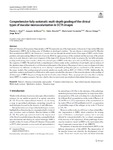Comprehensive fully-automatic multi-depth grading of the clinical types of macular neovascularization in OCTA images

Use este enlace para citar
http://hdl.handle.net/2183/36813Colecciones
- Investigación (FIC) [1683]
Metadatos
Mostrar el registro completo del ítemTítulo
Comprehensive fully-automatic multi-depth grading of the clinical types of macular neovascularization in OCTA imagesAutor(es)
Fecha
2023-08Cita bibliográfica
Vidal, P.L., de Moura, J., Almuiña, P. et al. Comprehensive fully-automatic multi-depth grading of the clinical types of macular neovascularization in OCTA images. Appl Intell 53, 25897–25918 (2023). https://doi.org/10.1007/s10489-023-04656-8
Resumen
[Abstract]: Optical Coherence Tomography Angiography or OCTA represents one of the main means of diagnosis of Age-related Macular Degeneration (AMD), the leading cause of blindness in developed countries. This eye disease is characterized by Macular Neovascularization (MNV), the formation of vessels that tear through the retinal tissues. Four types of MNV can be distinguished, each representing different levels of severity. Both the aggressiveness of the treatment and the recovery of the patient rely on an early detection and correct diagnosis of the stage of the disease. In this work, we propose the first fully-automatic grading methodology that considers all the four clinical types of MNV at the three most relevant OCTA scanning depths for the diagnosis of AMD. We perform both a comprehensive ablation study on the contribution of said depths and an analysis of the attention maps of the network in collaboration with experts of the domain. Our proposal aims to ease the diagnosis burden and decrease the influence of subjectivity on it, offering a explainable grading through the visualization of the attention of the expert models. Our grading proposal achieved satisfactory results with an AUC of 0.9224 ± 0.0381. Additionally, the qualitative analysis performed in collaboration with experts revealed the relevance of the avascular plexus in the grading of all three types of MNV (despite not being directly involved in some of them). Thus, our proposal is not only able to robustly detect MNV in complex scenarios, but also aided to discover previously unconsidered relationships between plexuses.
Palabras clave
Optical coherence tomography angiography
Computer-aided diagnosis
Age-related macular degeneration
Multi-depth analysis
Qualitative analysis
Attention maps
Computer-aided diagnosis
Age-related macular degeneration
Multi-depth analysis
Qualitative analysis
Attention maps
Versión del editor
Derechos
Atribución 4.0 Internacional
ISSN
0924-669X
1573-7497
1573-7497






